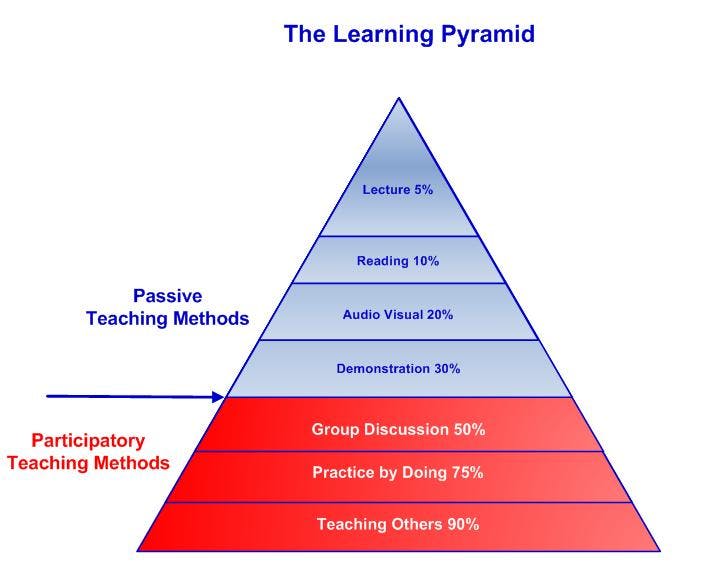A common problem that beginners experience is tutorial hell, where people watch online tutorials and even after completing those, find that they're not able to remember or retain that knowledge despite consuming all of that content. The issue I think, is that this method of learning doesn't help you retain that knowledge.
If you're like me, I've found it difficult to remember much what I've studied. I even forget content from articles I've recently read.
My personal ability to retain information is extremely poor, so I needed to look for a way to improve my retention rate.
The Learning Pyramid 🎓
There is a representation for retention for different types of learning called the learning pyramid. Which I ironically learned from someone else 'teaching' it to me.

The learning pyramid is a group of popular learning models and representations relating different degrees of retention induced from various type of learning.
| Retention rate | Learning activity before test of knowledge |
| 90% | Teach someone else/use immediately. |
| 75% | Practice what one learned. |
| 50% | Engaged in a group discussion. |
| 30% | Watch a demonstration. |
| 20% | Watch an audio-visual. |
| 10% | Reading. |
| 5% | Listening to a lecture. |
According to the learning pyramid, if you'd just read or listen to a lecture, the retention rate for that knowledge is low. However, if you were to practice what you've learned or teach someone else, then your retention rate would be substantially higher.
Improving Your Retention Rate 📈
So teaching people is supposedly the best method to retain your knowledge as you learn to code. There are many ways we can do this:
Blogging 💻
Reading blogs are one of the best ways to learn something new, so why don't you write your own? Writing your own blog and sharing knowledge is a form of teaching.
From my own experience, people who write posts on a particular topic will often make sure what they're writing is correct and so, a lot of care and attention to detail is put into those blog posts. As you write your own blog, you're more likely to remember the knowledge you're sharing in those posts.
Social media 📱
Despite it's reputation, social media is a great way to connect and teach others what you've learned. For example, on Twitter, the programming community is vibrant and full of like-minded individuals who're also constantly learning, if you've learned a new tip or something interesting, write it down and post it on social media.
If somebody asks a question on something you know the answer to, respond and add to the community. All of these actions will help re-enforce your learning and you're more likely to retain this knowledge as you continue your programming journey.
Join an online community 🤝
Slack and Discord are great places to find like-minded individuals who you can connect with. And again, being active in those communities, whether you're asking questions or answering them is a great way to retain things you've learned.
Mentoring 👨🏫
Some people may not realise that mentoring is a win/win scenario for both parties involved. Not only is the mentee learning from somebody whose more experienced than they are, but the mentor also gets the opportunity to go back to basics and will re-enforce what they teach and even learn new things along the way.
As you become more knowledgeable in coding, offering to mentor somebody else is probably the most efficient way to further retain that knowledge.
Keeping notes ✍
If you don't feel comfortable with teaching others, writing notes on what you've learned is also effective. Writing about what you've learned in your own words can be a great way to improve your understanding of the topic.
As you learn something either from a book, from someone at work or an article on the internet, it's probably a good idea to write notes somewhere you visit regularly so you can re-read it like a blog.
A programming journal is also a great place to keep these notes. I've written a blog post on Why You Should Keep a Programming Journal
Summary 📝
The common pattern to retaining information from my perspective is sharing what you've learned, whether its on a blog, social media or mentoring, if you actively and positively contribute to your community, you're not only helping others but also yourself.
For me, I've been reading more and also stumbling across articles on the internet that has great nuggets of information and not being able to remember much of it is the issue.
I'm hoping to resolve some of these issues by adding blog entries, joining and contributing to online communities and sharing things I've learned on Twitter. So far it's been great.
Thank you for reading and warm regards.
